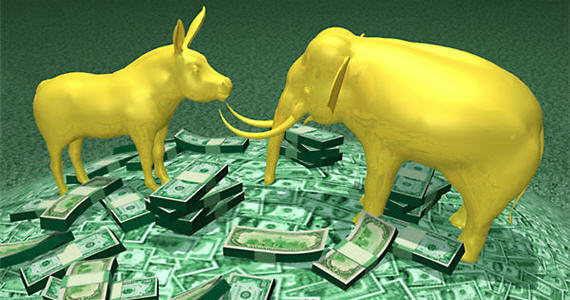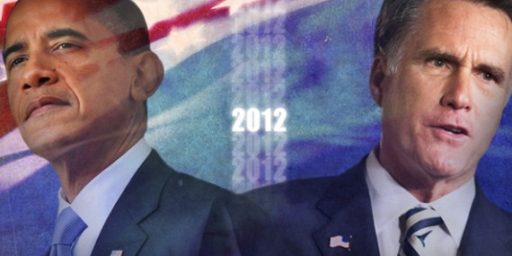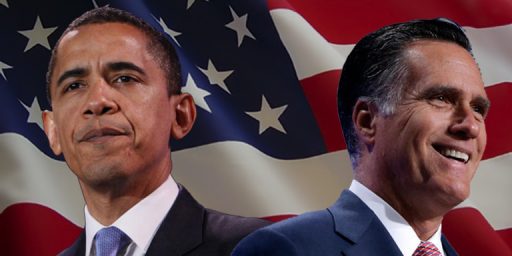Romney Ended July With Huge Cash Advantage Over Obama
Thanks to both three months in a row in which the Romney Campaign and the RNC and the act that the Obama Campaign spent a huge amount of money on ad buys in July, Republicans ended the month with a huge cash advantage:
Mitt Romney’s cash advantage over President Obama and the Democrats more than doubled in July, as intense Republican fund-raising and heavy spending by Mr. Obama and his allies left Mr. Romney and the Republican National Committee with $62 million more in the bank than the Democrats at the end of last month.
Mr. Obama’s campaign and the Democratic National Committee spent $91 million in July, significantly more than the $75 million the Democrats raised, underscoring the investments Mr. Obama made in technology and field staff as well as nearly $40 million his campaign spent on advertising that month. While Mr. Romney continued to husband his resources for the fall — he spent less than half of what Mr. Obama did on advertising — conservative “super PACs” and other outside groups stepped into the breach, spending millions of dollars on ads attacking Mr. Obama.
Mr. Obama and the Democrats raised a combined $75 million during July, according to Federal Election Commission reports filed Monday, compared with $101 million for Mr. Romney and the Republicans. The Democrats had about $124 million in cash on hand, most of it in Mr. Obama’s campaign account, while the Republicans had $186 million.
It is not unusual for challengers to outraise incumbents late in the campaign, and while Mr. Obama is being outraised now, he raised far more than Mr. Romney through 2011 and early this year.
But Mr. Romney’s extraordinary two-month run raising money — his team has pulled in more than $200 million in June and July — makes it virtually certain that Mr. Obama will not leave the Democratic convention next month with the cash advantage he had four years ago, when he heavily outspent the Republican candidate, John McCain, on his way to victory in November. The July totals do not include what Romney campaign officials said was a boost in both small online donations and large checks after Mr. Romney selected Representative Paul D. Ryan of Wisconsin as his running mate.
Mr. Obama’s campaign has had to spend heavily on its vaunted grass-roots infrastructure, posting $3 million in payroll costs in July. Mr. Romney has begun to catch up in swing states, showing rent and utility payments in Florida, Wisconsin, Colorado, Iowa and elsewhere beyond its Massachusetts headquarters.
And this doesn’t even include the SuperPACs.
It’s worth noting that one of the reasons that Romney’s bank account has grown so large is because the campaign is forbidden by law from spending money designated for the General Election campaign until he is officially named the party nominee. After that, expect the coffers to open up.







I still haven’t had this explained to me by anyone who knows:
Two Dark Money Groups Outspending All Super PACs Combined
On the surface it looks like real spending is unknown. Is anyone totaling the dark money outfits?
Well, there’s never been any real doubt that Romney would make for a formidable general election candidate. Whether or not he actually can win the election, however, remains to be seen and is a horse of an entirely different color.
I think I figured it out. Doug runs these “Romney raises cash” article because he wants us to imagine it is all Republican grandmothers taking money from the cookie jar. That way it would seem like a democratic (small ‘d’) win.
If you look at the dark money though, it shows that the billionaire really are dwarfing the grandmothers, and trying their darnedest to buy an election.
@john personna:
Unlike you, I don’t care that rich people give money to campaigns.
@Doug Mataconis:
Is that because you believe money has no effect on outcomes?
Or is that because you believe rich people deserve a stronger voice than poor?
John,
It’s because I believe in the First Amendment.
@Doug Mataconis:
I love it when you spoon feed answers. It’s because you know you can’t dump the whole thing at once, lest it smell to high heaven.
The first amendment is about speech. There are a serious of connections agreed by legislatures and courts about how much money equals speech and how it should be constrained.
Your post up top is about constrained money, not free and unrecorded money.
I believe money is not much like speech at all. And I hope courts will roll around to that rational view before long. Their current myopia is obviously politically inspired. The current court majority supports the current billionaires. That is all.
“a [series] of connections”
(If George Soros were outspending everyone on this election, the money=speech thing would not last 5 minutes in the supreme court.)
@Doug Mataconis:
While I understand that the interpretation of law lends itself to these types of policies, Is there also a duty to make sure the interpretation of these laws do not have unintended (or intended, polically speaking) consequences toward other laws? Is there an existing sense of integrity to make sure one law/policy does not contradict or undermine another? Or are some laws just more important than others?
Would love to read your take on the matter (with your law background and all).
@Doug Mataconis: So can you stop writing pear-clutching pieces about how “nasty” and “petty” this cycle is?
@Doug Mataconis:
I see that Doug believes in Anatole France’s famous observation that “The law, in its majestic equality, forbids the rich as well as the poor to sleep under bridges, to beg in the streets, and to steal bread.”
Similarly, the First Amendment allows the poor as well as the rich to spend hundreds of millions of dollars on campaign ads. It’s a level playing field! Both sides get their voice out there!
@Doug Mataconis:
That’s a pretty shallow, unserious answer. We all believe in the First Amendment. That’s a given. The question is, how is your interpretation of what the First Amendment requires and/or allows in these cases a more or less valid interpretation than ours? Convince us. Show your work. Flag-waving sloganeering won’t do it.
@Doug Mataconis: I’m frankly surprised that so many people considered that comment “Unhelpful.” I found it very helpful in understanding your world view.
@James: I’m not sure I understand your argument here. One can simultaneously think people ought to be free to engage in political speech and decry political speech that takes a nasty tone or is unserious.
@Rafer Janders: @john personna: @Rafer Janders: I’m more concerned than Doug with the potential for mischief and inequality here but we’re nonetheless in broad agreement that it should be permissible. Do I like it that the very rich have more influence on the political process than I do? No. But I can think of no rationale consistent with free speech to constrain that unhappy fact. The owners of the NYT, WaPo, and CNN have vastly more of a megaphone than I do or, hell, than Sheldon Adelson does. But no one is talking about shutting down the free press.
@James Joyner: Oh, I’m not saying Doug (or anyone else) isn’t allowed to simultaneously hold both of those opinions. What I am saying, is that Doug is continually unable to connect them.
@James:
Good point. If you’re going to allow anonymous, unverified sources to throw unlimited amounts of campaign cash into an election, you are going to get nasty campaigns. Why? Because the upside to them is large, and the downside (in terms of damage to their reputation) is non-existent.
Yes, we’ll have the best president money can buy.
I suspect down the road, after the American Collapse, we’ll look back and point out this decision to have been the beginning of the economic decline of the U.S. The rich can slant the game in their favour as much as they want–if only 1% can afford to have a nice life, your economy won’t be that big.
@James Joyner:
I’m pretty sure post-election statistical analysis could disprove that.
From the Guardian:
You know what just struck me? James (and I think Doug) were Huntsman supporters?
Do they not think the billionaires had anything to do with Huntsman’s viability?
It was OK when Obama had more money – now it’s bad.
In other words, all animals are equal, but some animals are more equal than others…
@john personna: @Doug Mataconis: Doug–let me put john personna’s question differently. Are you OK with unlimited anonymous money because you’re OK with the US totally becoming a corporate oligopoly? Isn’t it moderately obvious that that’s what will happen unless something changes?
When I was taught Civics in high school, admittedly some time ago, I was taught that free speech meant I could say what I wanted and the government couldn’t put me in jail for it. Although IIRC some of the founders did exactly that under the Alien and Sedition Act. There was nothing about the richest guy in town having a right to hire every billboard and TV station and drown out everyone else. The courts and all but the most rabid NRA types allow that some level of regulation of gun ownership is OK. Why can political speech not be subject to common sense regulation? As it has been many times in many places. What happened to the legal theory that the constitution is not a suicide pact?